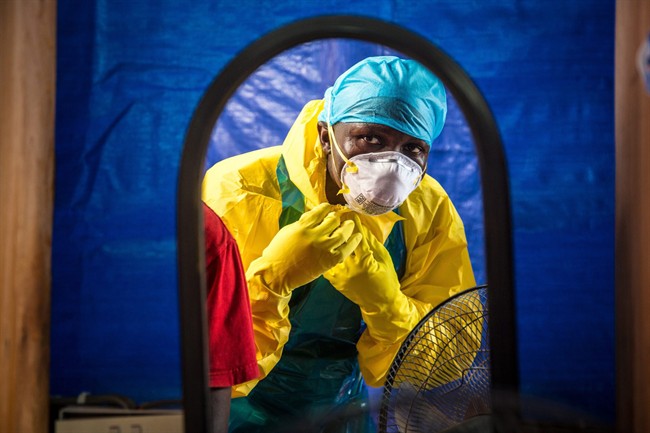TORONTO – The Ebola virus that made its way through West Africa last year is evolving, potentially leaving some experimental treatments useless, scientists warn in a new study.

Ebola has killed more than 8,400 people – mostly in Liberia, Sierra Leone and Guinea since the outbreak began in late 2013.
American researchers tracking the deadly virus’ genetic mutations say that they’ve discovered changes in the strain that’s responsible for the West African outbreak. And these mutations could get in the way of the effectiveness of experimental drugs that have made progress so far.
READ MORE: How does Ebola spread? 5 things you need to know
“Based on our findings, the virus has changed and is continuing to change,” Dr. Jeffrey Kugelman, a viral geneticist at the U.S. Army Medical Research Institute of Infectious Disease (USAMRIID), said. His team led the research out of the USAMRIID.
All viruses mutate. Just think of this year’s flu season, in which H3N2 was the main culprit of sickness in the Southern Hemisphere and Northern Hemisphere. While health officials prepared for a vaccine with the H3N2 virus, by the time it made its way to the Northern Hemisphere, it “drifted” and no longer matched the strain in the flu vaccine.
The drugs holding promise for a cure for Ebola are based on binding to or targeting a piece of the virus’ genetic sequence or a protein. But once that sequence changes through mutation – adapting or evolving – the drugs may not be as potent.
The U.S. researchers compared the current strain – called EBOV/Mak or Ebolavirus Makona – to other variants from previous outbreaks. One was from a 1976 Congo outbreak, called EBOV/Yam-May, while another was from 1995, called EBOV/Kik.
- Canadian man dies during Texas Ironman event. His widow wants answers as to why
- ‘Sciatica was gone’: hospital performs robot-assisted spinal surgery in Canadian first
- Canadians more likely to eat food past best-before date. What are the risks?
- Treatment from female doctors leads to lower death rates, study finds
READ MORE: 5 things to know about Canada’s experimental Ebola vaccine
Next to the other strains, the current virus had differences in more than 600 spots, or three per cent of the genome.
“Our work highlights the genetic changes that could affect these sequence-based drugs that were originally designed in the early 2000s based on virus strains from outbreaks in 1976 and 1995,” Gustavo Palacios, a senior study author, explained.
Zeroing in on those 600 disparities, the researchers found 10 new mutations that could interfere with the drugs that are currently being tested.
It’s a matter of putting these drugs to the test to check for their efficacy.
“The virus has not only changed since these therapies were designed, but it’s continuing to change,” Kugelman warned.
“Ebola researchers need to assess drug efficacy in a timely manner to make sure that valuable resources are not spent developing therapies that no longer work,” he explained.
Jason Tetro, a Canadian microbiologist and bestselling author, says this shouldn’t come as a surprise to experts in the field.
READ MORE: What you need to know about Canada’s contribution to Ebola vaccines
“You have to expect it. Anybody who has looked at HIV or influenza, for example, knows that when the virus mutates, it will gain resistance to a treatment,” he told Global News.
“This is a very common thing. When you have extended passages, the virus goes from one person to another and it will mutate or evolve, and when it does, there’s a high likelihood that it’ll evolve in an area you’re trying to target,” he explained.
The flu mutates on an hourly basis, changing incredibly fast and leaving scientists to think on their feet as to what it may do next. Tetro says the Ebola virus shouldn’t be treated any differently.
“If we falsely believe we can stop spread by one miracle drug or miracle therapeutics we’re fooling ourselves. The best thing to do is to prevent the virus from spreading,” he said.
READ MORE: Worried about Ebola? 5 answers to your questions
Kugelman says the experimental drugs aren’t approved by the U.S. Food and Drug Administration, but they’re being used to treat small numbers of patients under a World Health Organization emergency protocol.
His full findings were published in the journal mBio. Read the full findings here.
carmen.chai@globalnews.ca
Follow @Carmen_Chai




Comments